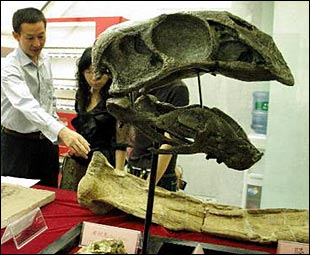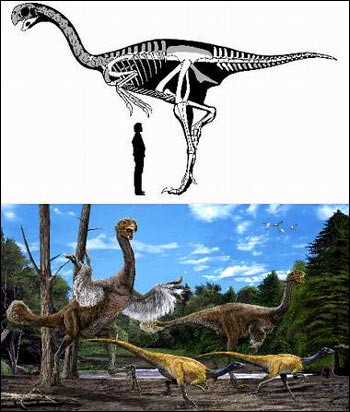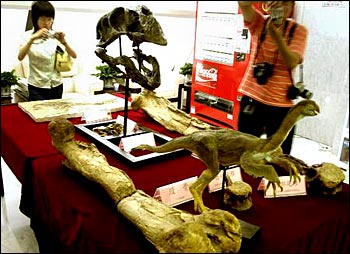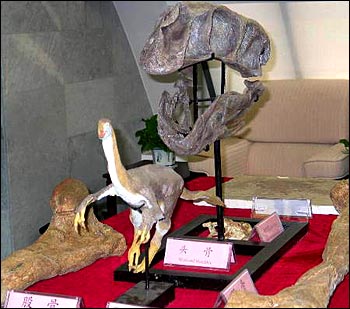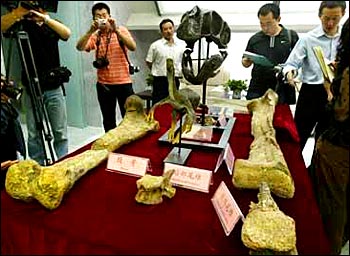| Home / Archaeology in China / Digs, Discoveries & Developments | Tools: Save | Print | E-mail | Most Read |
| Gigantic Bird-like Dinosaur Found in Inner Mongolia |
| Adjust font size: |
Chinese archaeologists have discovered the remains of gigantic bird-like dinosaur in the Gobi Desert in north China's Inner Mongolia Autonomous Region, which could overturn theories that dinosaurs became generally smaller as they evolved into birds.
The animal, named gigantoraptor erlianensis, is believed to have been about eight meters in length, weighed 1,400 kg, and stood up to five meters high. Chinese archaeologists said that despite its enormous size, gigantoraptor erlianensis belonged to the oviraptorosauria, a group of smaller, feathered animals. In light of its size, the researchers performed two different tests to confirm that it belonged to the oviraptorosaur family. "The analyses strongly supported the oviraptorosaur affinity of gigantoraptor erlianensis and suggested this new dinosaur was in an intermediate position in oviraptorosaurian evolution," explained Xu Xing, a researcher with the Institute of Vertebrate Paleontology and Paleon anthropology with the Chinese Academy of Sciences. Chinese archaeologists believe gigantoraptor erlianensis was an anomaly in the evolution of dinosaurs to birds and its discovery complicates the evolutionary pattern. Xu said they had no direct evidence that gigantoraptor erlianensis was feathered like its close relatives, but based on its close relationship to other feathered species such as caudipteryx and protarchaeopteryx, gigantoraptor erlianensis probably had feathers on its arms and tail. The largest known feathered animal so far is the 500-kg Stirton's thunder bird (dromornis stirtoni), which lived in Australia 6 to 8 million years ago. Gigantoraptor erlianensis was about three times as heavy as dromornis stirtoni. "Discovering such a big featured animal is beyond our imagination. It's like seeing a mouse as big as a pig," Xu said. Researchers found that gigantoraptor erlianensis possessed many features unknown in other dinosaurs, such as highly specialized caudal vertebrae and the bizarre humerus, suggesting that morphological diversity among the dinosaurs is higher than previously known. Xu said normally when dinosaurs became so large, they had proportionally stouter limbs and shorter lower legs than their smaller relatives. However, gigantoraptor erlianensis has much more slender limbs and longer lower legs than similarly-sized theropods, suggesting that it might have been adapted for running. Early archaeological study has shown that in their evolution into birds, dinosaurs became smaller in size and within each dinosaur group smaller species are normally more bird-like than their larger relatives. But Chinese archaeologists said gigantoraptor erlianensis is more bird-like than its small relatives in many features such as a longer arm and a more bird-like leg. "This suggests that there are different underlying mechanisms along the line to birds in theropod evolution," Xu said. Chinese researchers also found that the one-and-half-tone gigantoraptor erlianensis had no teeth, but was a beaked dinosaur. Gigantoraptor's diet remains unknown, but it shows both herbivorous features (such as small head and long neck) and carnivorous features (such as sharp claws). Other oviraptorosaurs are believed to have been plant-eaters, egg-eaters, mollusk-eaters, and meat-eaters according to various studies. Researchers deduced that the animal probably died in its 11th year based on the growth lines preserved in the fibular bone. They also inferred that the animal reached maturity within seven years and was still relatively young at the time of death. The bird-like dinosaur fossil was discovered in 2005 at Erlian Basin, known for its dinosaur fossils and other vertebrate fossils. The dissertation on gigantoraptor erlianensis will be published on June 14.
(Xinhua News Agency June 14, 2007) |
| Tools: Save | Print | E-mail | Most Read |
 |
| Related Stories |
